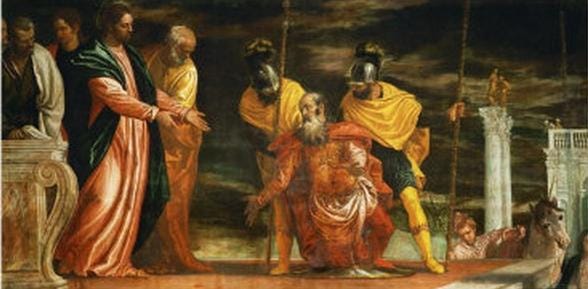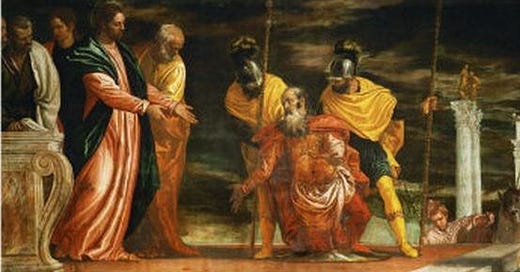
When he had entered Capernaum, a centurion came forward to him, appealing to him, “Lord, my servant is lying paralyzed at home, suffering terribly.” And he said to him, “I will come and heal him.”
But the centurion replied, “Lord, I am not worthy to have you come under my roof, but only say the word, and my servant will be healed. For I too am a man under authority, with soldiers under me. And I say to one, ‘Go,’ and he goes, and to another, ‘Come,’ and he comes, and to my servant, ‘Do this,’ and he does it.”
When Jesus heard this, he marveled and said to those who followed him, “Truly, I tell you, with no one in Israel have I found such faith. I tell you, many will come from east and west and recline at table with Abraham, Isaac, and Jacob in the kingdom of heaven, while the sons of the kingdom will be thrown into the outer darkness. In that place there will be weeping and gnashing of teeth.”
And to the centurion Jesus said, “Go; let it be done for you as you have believed.” And the servant was healed at that very moment.
~Matthew 8:5–13
In a previous newsletter, I wrote about embracing others’ burdens. This week’s passage suggests that sometimes, embracing others’ burdens means leaving those people behind.
This passage is consistent with the earlier one—though superficially they might seem to contradict each other.
Often, embracing others’ burdens smothers us. Living alongside someone can mean taking on their stress, their flaws, their problems. But just because we live alongside them doesn’t mean we can solve those problems, even when we make those problems our own.
In the story today, we meet an exemplary figure in this respect. Someone who, though he’s incredibly powerful, is in one critical way completely powerless: he can’t save his suffering servant.
It’s often the power itself that gets in the way of healing. The centurion is used to having people obey his orders:
And I say to one, ‘Go,’ and he goes, and to another, ‘Come,’ and he comes, and to my servant, ‘Do this,’ and he does it.
But when the centurion says to his servant, “Be healed,” his servant isn’t healed, no matter how many times he issues the command, no matter how loudly he issues the command, no matter how many threats he appends to the command. You can hear the desperation in his voice at the end of this sentence—“People obey me. Why won’t he? Why won’t this illness?”
The irony is that it’s not our own powerlessness that prevents us from fixing a problem. It’s our power. Our own stubborn refusal to acknowledge the limits of our power—even if, in some respects, that power is great—is what gets in the way of helping those we love.
In the end, the centurion recognizes not his powerlessness, but the incompleteness of his power. He can’t heal—but he can seek out someone who can. He doesn’t have the power he initially wants to have, but he has enough to help his servant, if only he can get out of his own way and recognize that fact.
The blind beggars and lepers and paralytics Jesus heals don’t have any illusions like this. They don’t presume anything. They just present themselves to Jesus as they are, broken and in desperate need.
The centurion’s presence in front of Jesus is different. He does have power, significant power. He has wealth, commanding a hundred soldiers. He has cultural authority too, representing imperial power in an occupied territory.
He humbles himself in each of these areas to ask for Jesus’s help: admitting his own weakness to ask for the help of a dirt-poor teacher from the occupied people.
Can you imagine the crowds around Jesus as the centurion approached? Likely awed, or anxious, even afraid at the centurion’s approach: “How did they find out about Jesus? What are they going to do, threaten him? Arrest him?” Imagine then the shock of seeing the centurion approach Jesus and address him as “Lord.”
The centurion had a realistic, clear-eyed view of his power and its limits. And he could also judge others’ gifts and authority, discerning who did have the power to help in this situation.
Often, we put an implicit quantity in Jesus’s statement:
Truly, I tell you, with no one in Israel have I found such [a great amount of] faith.
That’s not what he says, though. I think what Jesus finds remarkable about his faith isn’t how great it is, as if faith is something you could quantify and compare.
Rather, it’s how the centurion’s faith flows out of a well of humility that enables him to recognize both his own weakness and the strength of others—even those who seemed to lack all the sorts of power that matter.
Where are the areas where your own power or authority might be preventing you from recognizing your fundamental powerlessness?
What problems have you taken on because you secretly believe that without your help, there’s no hope?
How far along are you in solving those problems?
Are there any areas of your life in which you feel like letting go of your own control to pursue healing might be the healthiest path—for yourself, and especially for the other person?





“The irony is that it’s not our own powerlessness that prevents us from fixing a problem. It’s our power. Our own stubborn refusal to acknowledge the limits of our power” love this. It’s super important to remember that we are children of God and not God Himself. Thank you also for reminding us of the importance of surrendering to the throne. Not enough people want to do that these days. Myself included!